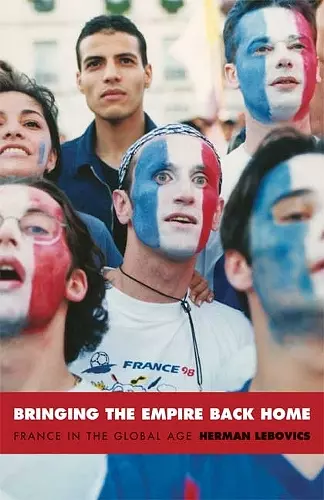Bringing the Empire Back Home
France in the Global Age
Format:Hardback
Publisher:Duke University Press
Published:23rd Jun '04
Currently unavailable, and unfortunately no date known when it will be back

A study of the meaning of culture in contemporary France with an emphasis on anti-globalization and post-colonial regionalism.
Thirty years ago, an international antiglobalization movement was born in the grazing lands of France’s Larzac plateau. In the 1970s, Larzac farmers were joined by others from around the world in their efforts to prevent the expansion of a local military base: by ecologists, religious pacifists, and urban leftists, and by social activists including American Indians and South American peasant leaders. In 1999 some of the same farmers who had fought the expansion of the base in the 1970s—including José Bové—dismantled the new local McDonald’s. That gesture was part of a protest against U.S. tariffs on specified French exports including Roquefort cheese, the region’s primary market product. The two struggles—the one against expanding a French army camp intended to train troops for postcolonial wars, the other against American economic might—were landmarks in the global campaign to preserve local cultures. They were also key episodes in the decades-long attempt by the French to define their cultural heritage within a much changed nation, a new Europe, and, especially, an American-dominated world.
In Bringing the Empire Back Home, the inventive cultural historian Herman Lebovics provides a riveting account of how intense disputes about what it means to be French have played out over the past half-century, redefining Paris, the regions, and the former colonies in relation to one another and the world at large. In a narrative populated with peasants, people from the former colonies, museum curators, former colonial administrators, left Christians, archaeologists, anthropologists, soccer players and their teenage fans, and, yes, leading government officials, Lebovics reveals contemporary French society and cultures as perhaps the West’s most important testing grounds of pluralism and assimilation. A lively cultural history, Bringing the Empire Back Home highlights not only the political significance of France’s efforts to synthesize the regional, national, European, ethnic postcolonial, and global but also the chaotic beauty of the endeavor.
“As usual, Herman Lebovics gives us an innovative and stimulating new perspective, now, on France in the age of globalization.”—Patrick Weil, senior research fellow at the National Center for Scientific Research (University of Paris I-Sorbonne) and author of Qu’est-ce qu’un Français? Histoire de la nationalité française depuis la Révolution (What is a Frenchman? The History of French Nationality from the Revolution to the Present Day)
“How—and even whether—to preserve their once-homogeneous culture in today’s open world is one of France’s supreme challenges today. With five sharply-etched case studies of cultural conflict—from the world soccer cup to museums to the defense of the Larzac plateau—Herman Lebovics casts penetrating light on French struggles to establish who they are and who they want to be.”—Robert O. Paxton, author of Europe in the 20th Century
“Scholars have been talking for some time about the colonial ‘legacies’ of the postcolonial present. French scholars have only recently and tentatively entered that conversation. Bringing the Empire Back Home makes an analytic and political leap as it takes us to new terrain of insight and locations of connection. Herman Lebovics’s version of what counts as French history is compelling, powerful, sensible, and deep. In setting out the direct lines between decolonization in the l960s and the antiglobalization movements that followed, he traces what joined New Caledonian separatists and Larzac farmers, protests against the ‘postcolonial military-industrial complex’ and the rise of the radical right, the new regionalisms in France in the l970s and the folk hero Bové who smashed McDonald’s windows. He identifies how imperial and capitalist expansion have been challenged in forms of popular demonstration, ingenuity, and spectacle that have repeatedly called into question what the ‘Republic’ is, who has a right to decide its boundaries, and who has what rights in it today. This is a must read that redefines the tenor and terrain of postcolonial scholarship.”—Ann Laura Stoler, author of Race and the Education of Desire: Foucault’s History of Sexuality and the Colonial Order of Things
ISBN: 9780822332602
Dimensions: unknown
Weight: 467g
248 pages